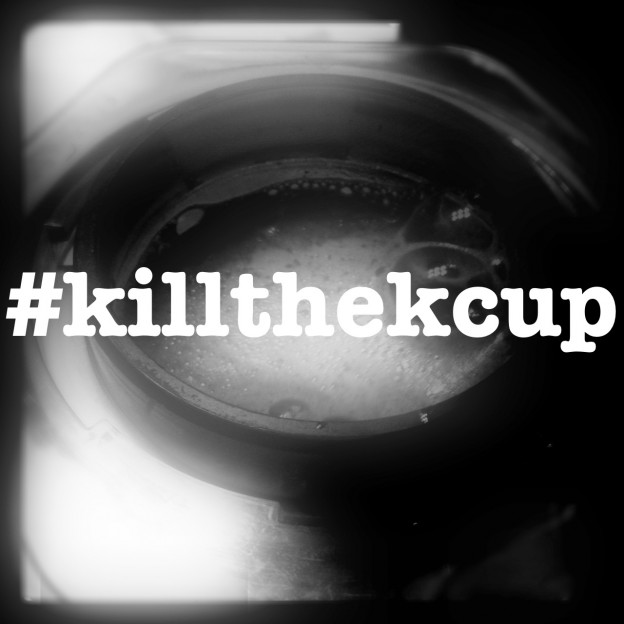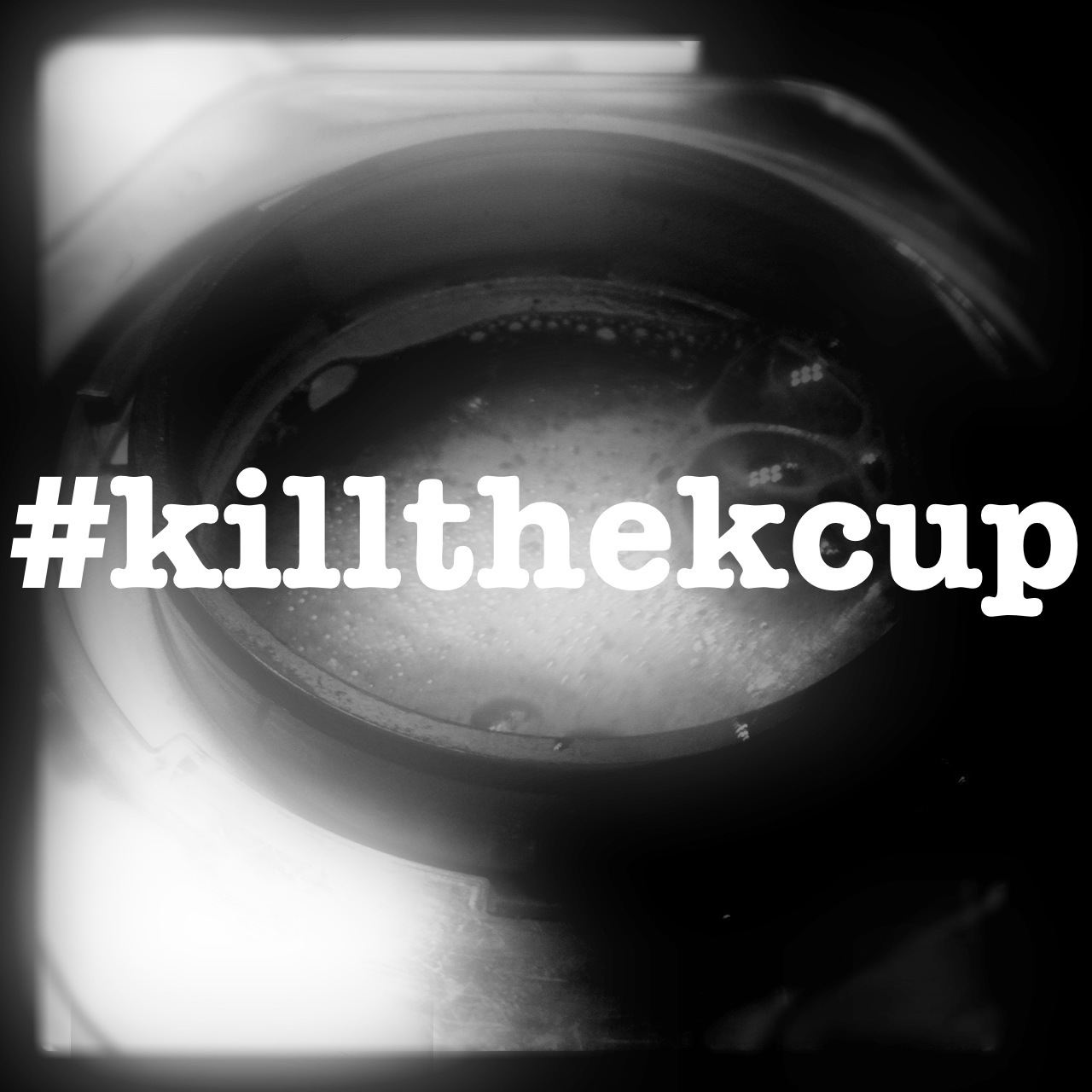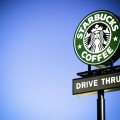“I love coffee! In fact, I use my Keurig every day.”
I can’t tell you how many times I’ve heard variations of this statement used by my friends and peers over the past several years.
Introduced in 1998, Keurig’s innovative single cup brewing system lets people brew the perfect cup of gourmet coffee in less than a minute, without having to grind beans, measure coffee, handle filters or clean up. It’s as simple as it gets.
From Keurig.com
Keurig has become synonymous with easy-to-brew idiot-proof coffee that supposedly tastes better than you might get from a normal drip coffee machine. There are several problems with Keurig: first, it is single-handedly ruining people’s perception of what great coffee tastes like. Second, it is operating under the false veil of being “cheaper” than the tools and fresh coffee used in other single-cup brew methods. Third, plastic Keurig K-cups are not recyclable and present an ever-increasing problem as they become more and more popular.
Dear Coffee, I Love You. did a post a on this back in March when the term “Love Keurig?” was a sponsored trending topic on Twitter. DCILY does a great job of communicating what so many of us feel that love coffee, myself included, when it comes to Keurig. More than that, DCILY has facts about Keurig that may surprise or even shock you. They have graciously allowed me to re-post a part of that post: below is the introduction. Click here for the full post.
————————————-
LOVE KEURIG? NOPE.
Love Keurig? Not one bit. But yesterday Twitter was all a-buzz about the machine that brews single-serve coffee pods (K-cups) while they were “promoted” to the top of the trending list. So I tweeted my 140 character dissertation on the topic, simply stating that “Keurig is bad for coffee and bad for the Earth. #killthekcup.” While a few people—145 of them—agreed with me and re-shared the message, not everyone felt the same.
I was quickly contacted by Keurig with a link to their reusable K-cup as if that rectified the issue and put an end to the discussion. Then a few loyal K-cup fans were upset that I criticized their right to never have to wipe coffee off their counter tops, followed by another guy who thought that the billions of non-recyclable plastic cups are not an issue and I should invest my activist angst elsewhere.
The reality, it is a big issue—not just in the coffee industry, but in the bigger ecological picture. When the most important ”R” of conservation is to “reduce,” ignoring the rapid growth of an unnecessary and disposable product like K-cups is far from inconsequential. So, I’ve broken down my issues with this growing coffee trend into four categories: economics, quality, environment and the company behind it all.






I’d like to mainly address the quality side of the argument. Yes, taste is subjective, but if the quality of the coffee was as poor as the author makes it sound, K-Cups would not be as universally enjoyed for their taste as they are. Quality and taste go hand in hand.
Yes, there are some duds too, but there are over 200 varieties from which to choose. You and the author of the former post don’t mention if you’ve tried any yourselves. I’m curious if you have and which ones.
Not everyone who loves their Keurig is a former Maxwell House or Folgers coffee drinker. I have friends who drink Dawson Taylor coffee regularly (from the town where you and I are from) and own a Keurig and enjoy K-Cups too.
I know many other people with a taste for high quality coffee who love the taste of K-Cups. Drinking K-Cups hasn’t somehow changed their taste buds. Convenience and variety are two big reasons they get a Keurig, but almost everyone who buys one (or asks for it as a gift) tastes the coffee first and likes it.
As far as expense, I’m finding that I spend about the same amount on K-Cups that I would going out to coffee once a week. And I seldom go out for coffee now that I have a Keurig. I enjoy my K-Cups that much.
Thanks for the comment! I appreciate the feedback. Please hear my heart in this response: I’m not trying to come off as a coffee snob or elitist. I’m just stating facts, and what my opinion based on those facts.
When coffee is roasted, it has a freshness shelf life of a couple weeks. If it is not consumed in that time frame, the coffee loses many of the flavors that make it so compelling. It doesn’t matter how great the coffee was when it was roasted – all coffees have a shelf life.
The effect is compounded when the coffee is ground. When coffee is ground, a larger surface area of the beans are subjected to oxygen, moisture in the air, and sunlight causing the beans to lose their freshness even faster. Ground coffee can only stay truly fresh for a few days, max.
K-cups contain ground coffee and sit on store shelves for months before they are bought by the consumer and consumed. No matter how you try to cut it, K-cups do not contain fresh coffee.
Here’s an analogy to help put it in perspective:
Say we have two containers of apples at a grocery store. One contains freshly picked apples that are ripe, green, and delectable. The other contains apples that used to be delicious, but have since sat in the sun, been picked up by dozens of people, and are now bruised and squishy as a result. Suppose further that the bruised cart of apples is placed right by the store entrance with a huge sign that says “FRESH DELICIOUS APPLES!” on it while the cart of truly fresh apples is located in the back of the store. Nearly everyone purchases the bruised apples because they are conveniently placed and easily accessible. They don’t see the fresh apples, and as a result they don’t compare the two containers. Eventually, the bruised apples become popular. People even go so far as to argue that the apples are delicious and the quality is great.
You see where I’m going with this. Many people enjoy the Keurig and the K-cups simply because they haven’t had the chance to compare it to the fresh apples. And in reality: the fresh apples are just as accessible and infinitely more delicious.
I understand the “convenience and variety” argument, but I don’t buy it. I think those are surface excuses that don’t deal with the heart of what makes Keurigs so popular. The real reason? People know very little about coffee, and don’t want to learn. They are buying a product that society tells them is “FRESH AND DELICIOUS” while in reality they are consuming an overpriced and low quality product.
And yes, K-cups are overpriced. After doing the math, K-cup packs come out to about $25-$35 per pound of coffee they contain. The average 1 lb bag of specialty coffee goes for $20.
I do agree that K-Cups are not fresh, but I think there is another apple comparison we could make here. We could say that K-Cups are like dried apples. No, they will never be fresh apples, but that doesn’t mean they can’t taste good and be enjoyed by people who like both fresh and dried apples. The dried apples may just suit their lifestyle better at certain times.
Neither the original author, nor you, address one of the important issues that Keurig not only addresses… it solves it better than any alternative.
I was at a week long meeting in December. There were 5-6 people there. I, and couple of others, like our coffee dark, black, and strong. There were 2 others that liked theirs weaker and flavored. Rather than brew multiple pots or force people to go out and spend $4 on a coffee, we could each select exactly what we wanted.
For the same reason, the Keurig is an ideal solution for a small to medium sized business, the cost is easily covered by have people drop $.50 into a jar whenever they brew a cup.
There is simply no way to solve the environmental dilemma, but honestly there are much more serious issues facing our environment and I’m not sure that killing the KCup is the best to start in solving the world’s problems.
Kevin, you bring up a great point that I did not consider while writing this post. A friend of mine actually brought up the same point on Facebook to me a few days ago. Here’s a link to the article he referenced:
http://www.thefreemanonline.org/headline/coffee-edition/
This is probably the only aspect of the Keurig that appeals to me. The concept of “mass customization” is powerful, and it works (as you’ve stated). I can’t argue with that. As the author of the above article said, however, this is not a concept unique to coffee. Burger King did it, Dell did it, and many other companies have followed suite. Even when discussing coffee, Keurig isn’t alone in this regard. Tassimo T-discs have been around for a while and have experienced great success.
If a company can find a way to implement mass customization into an easy-to-use form factor with fresh, high quality coffee that isn’t overpriced, contained in containers that do not present environmental risks, I would be 100% for it.
In regards to your comment on the environmental dilemma, this is a coffee blog. There are probably a million other “more important” concerns other than eliminating Keurig K-cups. Within the realm of coffee, however, this is a very real, and comparatively large concern that needs to be addressed.
I will frankly never buy a Keurig because the bang for the buck simply isn’t there. Likewise I will never pay $20/lb for coffee but $10+ isn’t out of the question. I like coffee, but I like beer more and $10 buys me a six pack of a decent quality brew.
I have a keurig and ill admit that the coffee sucks compared to the coffee my parents brew. But I’m in college and it’s a thousand times better than the school’s coffee, and a few cents cheaper per cup too. Sure I could buy a drip coffee brewer and brew a whole pot. Then I can drink a cup and dump the rest down the sink. As appealing as that sounds though, I can barely find the motivation to make a peanut butter and jelly sandwich. Keurig is just a button away. Also the environment risk is a load of bs. People complain about that as they drive their gas-driven cars and poop in clean drinkable water.
Joe – I acknowledge your position. If you go back and read the post, you can actually make great quality coffee for the same price as Keurig glorified instant coffee. Ease of use is definitely something to take into consideration. Being in college myself, however, I’ve found that making a cup of great coffee is as delicious as it is cathartic. I’d give it a shot before giving up due to “lack of motivation.”
Additionally, the environment risks are not a load of bs. They are a legitimate argument that you are dismissing by setting up the straw man of other environmental concerns that are worse. Saying that there are worse ways to destroy the planet isn’t a viable argument against the small things that are still bad for the environment.
Cheers,
The Coffee Guy